Hello everyone!
I deeply apologize for not having posted something in a very long time. I have been rather preoccupied with IB (for all those who don't know, I am doing the IB program - perhaps I'll post something on that topic later on) but that doesn't mean I've given up on my books! A few books I read these past (frightening) months were Memoirs of a Geisha, A Court of Mist and Fury, The Girl Who Played with Fire, Stardust (Neil Gaiman) and a few more. From now on, I plan on posting a 'Monthly Ledger' of all the 'bibliophilic' events in my life, starting with today! Vamos, let's delve into October!
Presenting....
Sophie's World by Jostein Gaarder
This was a book my Theory of Knowledge teacher had suggested way back in the beginning of my IB program. (TOK is a subject focusing on philosophy - and its history - and aims to develop critical thinking skills. In addition, you also develop the art of - forgive me - 'bullshitting' - through essays. But I personally find TOK an amazing subject to discuss about. It's definitely one of my most favourite IB classes).
I digress, as always.
Moving on, Sophie's World's is a story revolving around 14-year-old Norwegian teenager (on the threshold of 15) Sophie Amundsun, who begins to get mysterious letters from a man. The contents of these letters concern something dynamic and gruesome: the history of philosophy. As the novel progresses, Sophie begins to get letters from her 'philosophy teacher' and eventually meets him: her a philosophy teacher - Alberto Knox - is a middle-aged man with a blue beret and a little apartment of priceless possessions over the ages: from the Dutch philosopher Spinoza's optical glass lenses to the first edition of a book of Descartes' philosophical essays published in 1637, of which the very famous Discourse on Method originally appeared. As Alberto and Sophie advance through the ages, they learn about about everyone from Socrates (the very first Greek 'philosopher' in the world) to Sartre ( a French philosopher, one of the last notable ones of the last century). They learn about dualism, pantheism, existentialism, romanticism, nihilism, neoplatonism, Platonism, feminism, capitalism, communism, socialism, egoism, empiricism, rationalism, Hegelism, idealism, materialism, pluralism, skepticism, stoicism, sophism and together with them, so did I. The more Sophie learns, the more she realizes that her world is....imaginary. No, not in some artistic, rhetorical sense but literally. She and Alberto Knox use the techniques of various philosophers and come to understand that they are the mere figments of the imagination of Major Albert Knag, a Norwegian UN officer fighting on the war-front in Lebanon. They were being toyed around as a surprise for Major Albert Knag's daughter, Hilde's, birthday. Literally. How they escape the clutches of the Major forms the rest of the plot.
Comments:
A good book, but only if you have a lot of time in your hands. Reading it in one week, like I did due to time constraints, is not a very good idea, since this book requires even you to put your thoughts into it. Moreover, I got rather annoyed towards the end of the book because I was engrossed in the mystery of the Major more than the the history of philosophy and I wanted to get it over with as soon as possible. Sometimes, I wish Alberto weren't so mysterious too, what with his ambiguous wording and all-knowing persona.
On the upside, Jostein Gaarder is an amazing storyteller - he explains every major philosophy with such simplicity, without betraying their sheer importance. There are a multitude of examples for each and unlike Wikipedia pages, he narrates philosophy like a story, each philosopher gradually folding into another and another and another and so on.
Quick Quotes Quill:
"The universe is a great mystery"
Concerning Romanticists: "This yearning for something distant and unattainable was characteristic of the Romantics. They longed for bygones eras, such as the Middle Ages, which now became enthusiastically reappraised after the Enlightenment's negative evaluation. And they longed for distant cultures like the Orient with its mysticism. Or else they would feel drawn to Night, to Twilight, to old ruins and the supernatural. They were preoccupied with that we usually refer to as the dark side of life, or the murky, uncanny and mystical."
How similar is this to the teenagers of today! A few notable Romanticists and their work: The Sorrows of the Young Werther by Goethe, 1774; She Walks in Beauty by Lord Byron; Heinrich von Ofterdingen by Novalis, 1801 (unfinished). Most Romantics died young, either due to tuberculosis or suicide, the latter of which was rising in Europe because unrequited love was becoming a popular concept. However, though Romanticism concerned majorly of romantic love, it also concerned the synthesis of philosophy, nature study and poetry. They believed the world and its people are one (world spirit) and that nature is a living, thriving organism. "Sitting in your attic dashing off inspired verses and investigating the life of plants or the composition of rocks were only two sides of the same coin because nature is not a dead mechanism, it is one living world spirit". Perhaps it is because of thoughts like these that most Romanticists either died young or grew up and became anti-Romantic and conservationist. Popular Romantics included Beethoven, Hans Christian Anderson, Brothers Grimm and Schelling.
Two more quotes which I absolutely loved and have truly experienced:
"The fairy tale gave the writer free rein to exploit his "universe-imagination" [universe-creating refers to God]. And even the creative act was not always completely conscious. The writer could experience that his story was being written by some innate force. He could practically be in a hypnotic trance while he wrote". "
[On the breaking of the barrier between the conscious and the subconscious] "All artists are aware of that. But then suddenly it's as if all the doors and all drawers fly open. Everything comes tumbling out by itself, and we can find all the words and images we need. This is when we have"lifted the lid" of the unconscious. We can call it inspiration, Sophie. It feels as if what we are drawing or writing is coming from some outside source. "
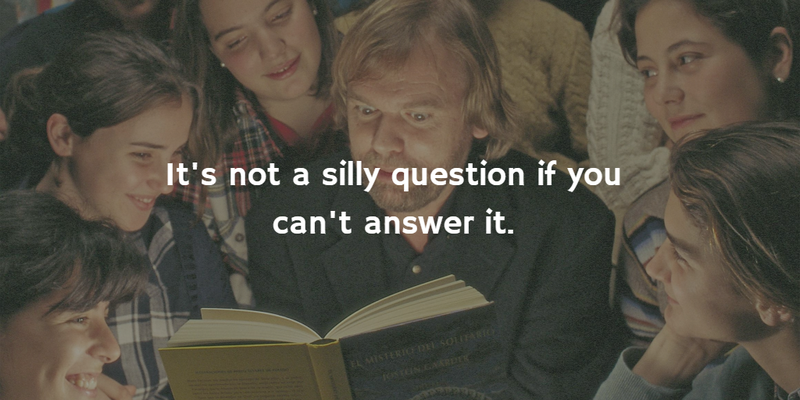
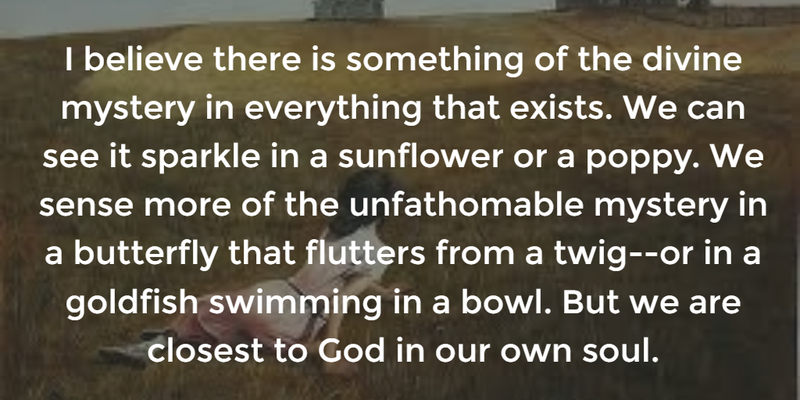

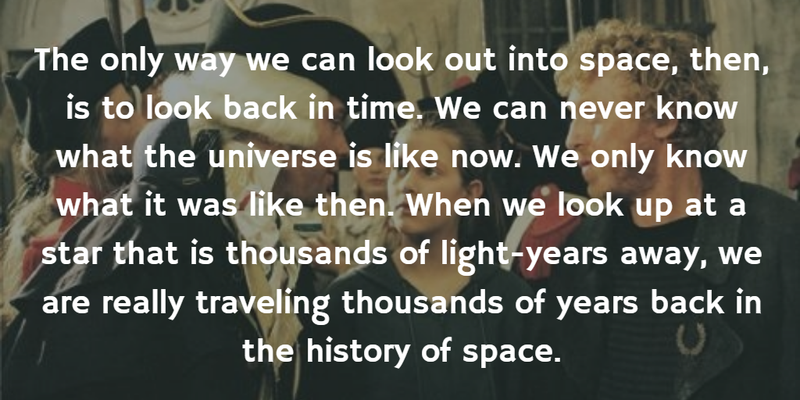
And I'd like to day goodbye with one last thought:
I deeply apologize for not having posted something in a very long time. I have been rather preoccupied with IB (for all those who don't know, I am doing the IB program - perhaps I'll post something on that topic later on) but that doesn't mean I've given up on my books! A few books I read these past (frightening) months were Memoirs of a Geisha, A Court of Mist and Fury, The Girl Who Played with Fire, Stardust (Neil Gaiman) and a few more. From now on, I plan on posting a 'Monthly Ledger' of all the 'bibliophilic' events in my life, starting with today! Vamos, let's delve into October!
Presenting....
Sophie's World by Jostein Gaarder
This was a book my Theory of Knowledge teacher had suggested way back in the beginning of my IB program. (TOK is a subject focusing on philosophy - and its history - and aims to develop critical thinking skills. In addition, you also develop the art of - forgive me - 'bullshitting' - through essays. But I personally find TOK an amazing subject to discuss about. It's definitely one of my most favourite IB classes).
I digress, as always.
Moving on, Sophie's World's is a story revolving around 14-year-old Norwegian teenager (on the threshold of 15) Sophie Amundsun, who begins to get mysterious letters from a man. The contents of these letters concern something dynamic and gruesome: the history of philosophy. As the novel progresses, Sophie begins to get letters from her 'philosophy teacher' and eventually meets him: her a philosophy teacher - Alberto Knox - is a middle-aged man with a blue beret and a little apartment of priceless possessions over the ages: from the Dutch philosopher Spinoza's optical glass lenses to the first edition of a book of Descartes' philosophical essays published in 1637, of which the very famous Discourse on Method originally appeared. As Alberto and Sophie advance through the ages, they learn about about everyone from Socrates (the very first Greek 'philosopher' in the world) to Sartre ( a French philosopher, one of the last notable ones of the last century). They learn about dualism, pantheism, existentialism, romanticism, nihilism, neoplatonism, Platonism, feminism, capitalism, communism, socialism, egoism, empiricism, rationalism, Hegelism, idealism, materialism, pluralism, skepticism, stoicism, sophism and together with them, so did I. The more Sophie learns, the more she realizes that her world is....imaginary. No, not in some artistic, rhetorical sense but literally. She and Alberto Knox use the techniques of various philosophers and come to understand that they are the mere figments of the imagination of Major Albert Knag, a Norwegian UN officer fighting on the war-front in Lebanon. They were being toyed around as a surprise for Major Albert Knag's daughter, Hilde's, birthday. Literally. How they escape the clutches of the Major forms the rest of the plot.
Comments:
A good book, but only if you have a lot of time in your hands. Reading it in one week, like I did due to time constraints, is not a very good idea, since this book requires even you to put your thoughts into it. Moreover, I got rather annoyed towards the end of the book because I was engrossed in the mystery of the Major more than the the history of philosophy and I wanted to get it over with as soon as possible. Sometimes, I wish Alberto weren't so mysterious too, what with his ambiguous wording and all-knowing persona.
On the upside, Jostein Gaarder is an amazing storyteller - he explains every major philosophy with such simplicity, without betraying their sheer importance. There are a multitude of examples for each and unlike Wikipedia pages, he narrates philosophy like a story, each philosopher gradually folding into another and another and another and so on.
Quick Quotes Quill:
"The universe is a great mystery"
Concerning Romanticists: "This yearning for something distant and unattainable was characteristic of the Romantics. They longed for bygones eras, such as the Middle Ages, which now became enthusiastically reappraised after the Enlightenment's negative evaluation. And they longed for distant cultures like the Orient with its mysticism. Or else they would feel drawn to Night, to Twilight, to old ruins and the supernatural. They were preoccupied with that we usually refer to as the dark side of life, or the murky, uncanny and mystical."
How similar is this to the teenagers of today! A few notable Romanticists and their work: The Sorrows of the Young Werther by Goethe, 1774; She Walks in Beauty by Lord Byron; Heinrich von Ofterdingen by Novalis, 1801 (unfinished). Most Romantics died young, either due to tuberculosis or suicide, the latter of which was rising in Europe because unrequited love was becoming a popular concept. However, though Romanticism concerned majorly of romantic love, it also concerned the synthesis of philosophy, nature study and poetry. They believed the world and its people are one (world spirit) and that nature is a living, thriving organism. "Sitting in your attic dashing off inspired verses and investigating the life of plants or the composition of rocks were only two sides of the same coin because nature is not a dead mechanism, it is one living world spirit". Perhaps it is because of thoughts like these that most Romanticists either died young or grew up and became anti-Romantic and conservationist. Popular Romantics included Beethoven, Hans Christian Anderson, Brothers Grimm and Schelling.
Two more quotes which I absolutely loved and have truly experienced:
"The fairy tale gave the writer free rein to exploit his "universe-imagination" [universe-creating refers to God]. And even the creative act was not always completely conscious. The writer could experience that his story was being written by some innate force. He could practically be in a hypnotic trance while he wrote". "
[On the breaking of the barrier between the conscious and the subconscious] "All artists are aware of that. But then suddenly it's as if all the doors and all drawers fly open. Everything comes tumbling out by itself, and we can find all the words and images we need. This is when we have"lifted the lid" of the unconscious. We can call it inspiration, Sophie. It feels as if what we are drawing or writing is coming from some outside source. "




And I'd like to day goodbye with one last thought:

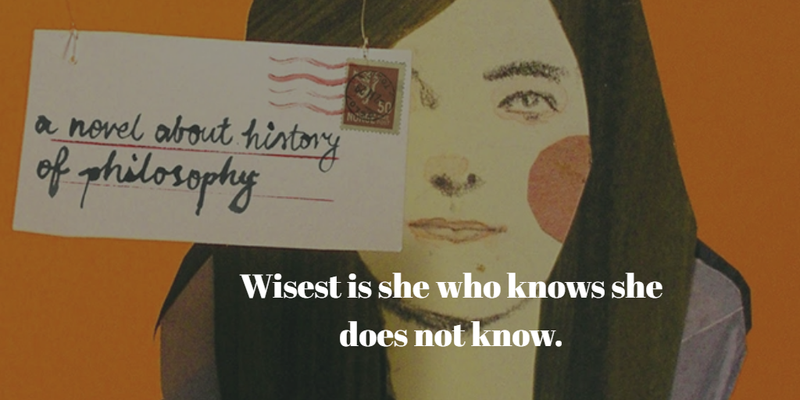
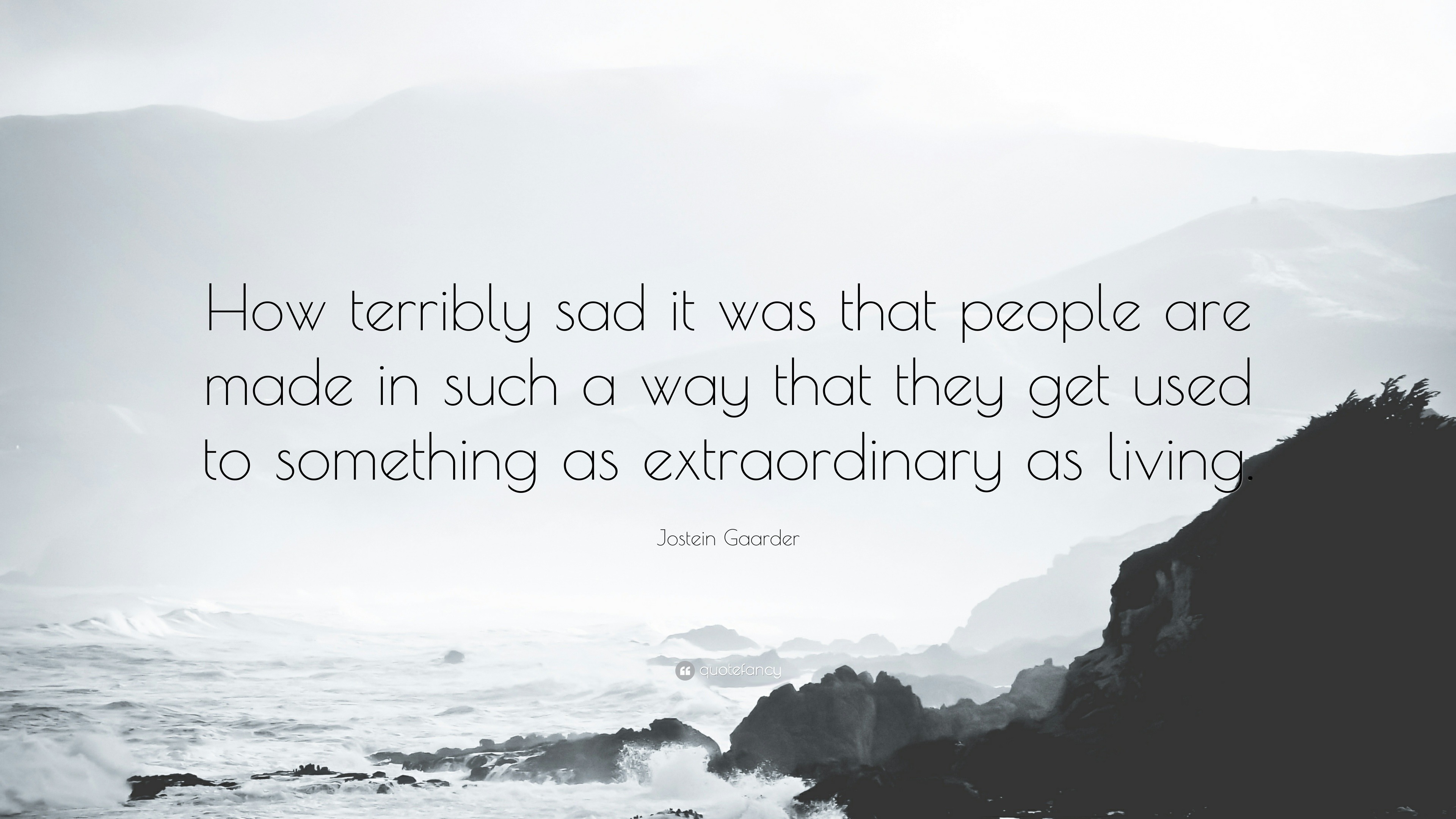
I love the last quote. We are so cocooned into our regular lives that we no longer find joy in new things. It's so mundane.
ReplyDeleteYup, definitely. It's also because nobody tells us and nobody lets us enjoy things that make life beautiful.
Delete